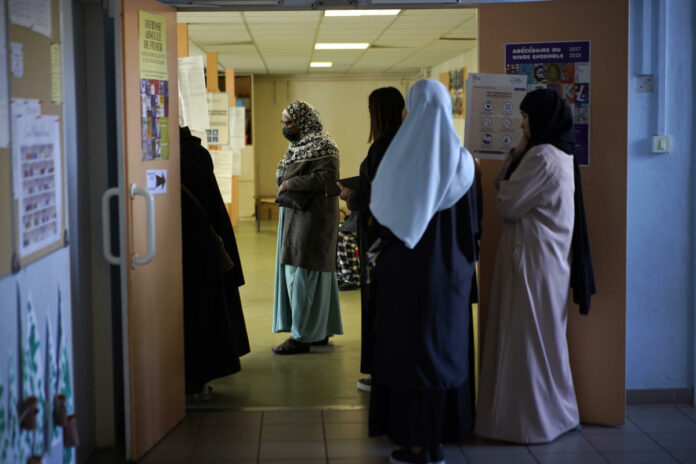PARIS (AP) — France’s education minister announced Monday a ban on long robes in classrooms starting with the new school year, saying the garments worn mainly by Muslims are testing secularism in the nation’s schools.
Critics say that abayas, worn by women, and khamis, the male garb, are no more than a fashion statement. They say the garments do not constitute an ostentatious sign of religion and should not be banned from classrooms under a 2004 law.
For Gabriel Attal, the recently appointed education chief, the garments are “an infringement on secularism,” a foundational principle for France, and, in some cases, a bid to destabilize schools.
The 34-year-old Attal, appointed in July, was potentially moving into a minefield with his ban on long robes to “protect” secularism, prompted by growing reports of the garments in some classrooms around the country. Previous statements and laws on secularism have seeded acrimonious debate.
“Our schools are continually tested. We know that,” Attal said at a news conference a week ahead of the start of the school year. He said that the wearing of abayas and khamis, a “new phenomenon,” has recently grown, and must be met with a firm response to tackle what sometimes amounts to “infringements, attempts at destabilization.”
“We must stand together. We will stand together. … The abaya has no place in school, no more than religious symbols,” Attal said, referring to the 2004 law which banned Muslim headscarves, Jewish kippas, large crosses and other “ostentatious” religious accoutrements from classrooms.
French authorities have increasingly moved to defend secularism, a constitutional principle meant to guarantee religious neutrality, as society grows complex in a multicultural nation in which some French Muslims seek to show their religious identity. Authorities fear that religious symbols are a gateway to Islamic radicalism, while some Muslims feel stigmatized by efforts to make them conform. Islam is the second religion in France.
A 2021 law against what officials refer to as “separatism” was aimed at further strengthening the French value of secularism, including among public servants. It gave new teeth to detection of signs of Islamic radicalism, notably by strengthening oversight of mosques, schools and sports clubs.
Voices quickly were raised against the plan to ban long robes from schools.
“For me, the abaya is not a religious garb. It’s a kind of fashion,” Abdallah Zekri, a leader of the French Council for the Muslim Faith, said on the news station BFMTV. The abaya is “a long and ample robe. It has nothing to do (with religion).” Zekri’s words reflected the position of his organization, that the abaya is not a religious sign for Muslims.
Attal’s predecessor as education minister, Pap Ndiaye, failed to crack down on long robes in the classroom, effectively leaving the choice to school principals as the phenomenon grew. In the past year, signs of infringement on secularism increased 120% between the 2022-2023 school year and the previous one, from 2,167 to 4,710, according to a confidential note obtained by the newspaper Le Monde. The increase was largely due to the wearing of abayas and khamis.
“Public schools must, at all costs, perhaps more than any other institution, be protected from religious proselytism, from any embryo of communitarianism,” Attal said, referring to the notion of communities leaning into their own cultural, spiritual or other aspects of their origins at the expense of their Frenchness.
To enforce the ban on abayas and khamis in classrooms, Attal said that 14,000 educational personnel in leadership positions would be trained by the end of this year to deal with the matter, and 300,000 personnel would be trained by 2025. Top administrators will visit schools seeking help as well as those “where we judge specific needs to manage the start of school with them.”
The 2004 law banning religious symbols in classrooms was passed after months of bitter wrangling and a marathon parliamentary debate. It was too early to say whether the education minister’s order banning long robes from schools would lead to acrimony inside classrooms.
Hard-right politician Eric Zemmour, head of the small Reconquest! party opposed to immigrants, posted on X, the former Twitter: “Banning abayas is a first good step if it is applied.” He wants uniforms in classrooms. Lawmaker for the hard-left France Unbowed party, Clementine Autain, called the move “anti-constitutional” and asked “How far will the clothes police go?”


